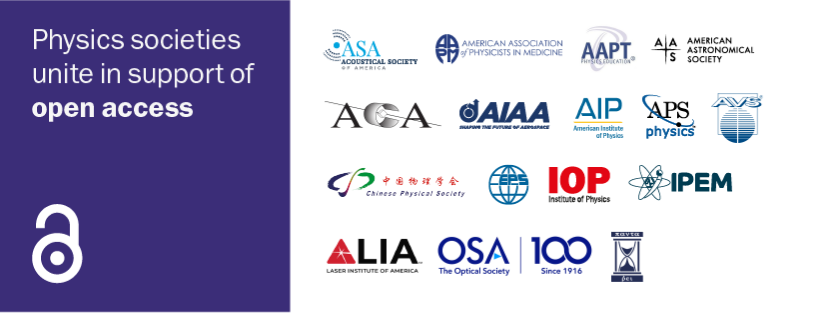December, 2020
Achieving Open Access in Physics
We as physics societies exist to ensure that physics delivers on its exceptional potential to benefit society. We recognise the important role of universal access to knowledge in achieving this goal and are therefore committed to making open access (OA) to physics research a reality. We welcome the increased policy momentum towards open science publishing but urge all stakeholders to ensure that the routes by which we achieve OA preserve the diversity, quality and financial sustainability of the peer-reviewed publishing upon which our research community depends.
Physics has long embraced open science and OA to research results. Physicists were among the first to share preprints via arXiv (1991), launch fully OA journals such as Optics Express (1997) and New Journal of Physics (1998), and implement innovative OA business models like SCOAP3(2014). We continue to invest in launching high-quality OA journals, such as Physical Review X and Optica, and have established a range of transformative agreements with institutions to facilitate their transition to OA. Over the past decade, such proactive engagement has resulted in an average annual growth in OA physics articles of more than 25%, compared with an overall average annual growth in physics articles of around 2%.
Whilst there has been considerable progress in creating fully OA physics journals, more than 85% of all physics articles continue to be published in hybried journals. Hybrid journals therefore still have an essential role to play in balancing the expansion of OA with preserving researchers’ freedom to publish in the most appropriate journal for their research. The ability of these journals to transition sustainably is challenged by the prospect of free and unrestricted distribution of accepted manuscripts without concomitant funding for the peer review and publication costs involved. We are concerned that policies such as the proposed Coalition S Rights Retention Strategy would undermine the viability of high-quality hybrid journals and mean that many physics researchers no longer have an adequate range of options or freedom of choice in where they publish their work.
Of course, any future without fees for readers of research would require the costs of the scholarly publication system to be funded entirely by the producers of research or other institutional sponsors. Broader global financial support for OA will need to be in place before most hybrid physics journals can viably transition – for instance, the current proportion of paid OA physics articles produced by EU member states is around twice that of India or Russia. Adjustments to the global flow of funding will take time.
In the meantime, we are fortunate in physics to have a thriving culture of sharing early-stage results, prior to peer review, via preprint platforms such as arXiv. There remains considerable opportunity to expand public access to research rapidly, even in physics, if funders increase their recognition and encouragement for this practice as a complement to peer-reviewed journal publication.
Physicists will continue to innovate in OA and open science, and physics societies endorse any and all OA models that can provide financially sustainable support for author choice and the quality of peer review and publication upon which excellent physics research relies.
Signatures
Angela Keyser on behalf of the American Association of Physicists in Medicine
Lisa Keefe on behalf of the American Crystallographic Association
Michael Moloney on behalf of the American Institute of Physics
Kate Kirby on behalf of the American Physical Society
Jennifer Pesanelli on behalf of the Biophysical Society
Petra Rudolf on behalf of the European Physical Society
Paul Hardaker on behalf of the Institute of Physics
Elizabeth Rogan on behalf of the Optical Society (OSA)
Michael Graham on behalf of the Society of Rheology
Beth Cunningham on behalf of the American Association of Physics Teachers

Physics societies unite in support of open access. Drew Tech / AIP